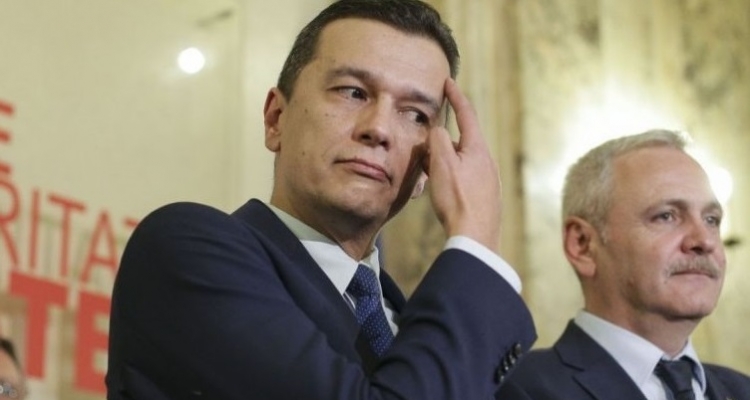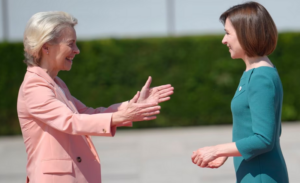 The PSD-ALDE coalition submitted a government program to Parliament. It emerges from the document the current government’s intention to control most of the economy against the background of social tranquillity created by tax cuts, pension and salary increases.
The PSD-ALDE coalition submitted a government program to Parliament. It emerges from the document the current government’s intention to control most of the economy against the background of social tranquillity created by tax cuts, pension and salary increases.
Against the background of the predictably significant decreases in the budget revenues, caused by the intent to implement the social measures with priority (on Thursday, for instance, an extraordinary session of the Chamber of Deputies has been scheduled for cancelling the taxation of pensions), the challenge of the new government will be to keep within the deficit target.
A first clue to how they might do that: while the government program has set clear deadlines for wage increases and cutting some taxes, it does not mention any fixed terms for most points of the timetable for the expected investments.
The government program has two new elements:
- the concept of re-industrialization of the country and
- positioning the state as a major player in the economy through two funds, to be created.
PSD-ALDE coalition tries to ensure the economic growth by lowering the labour costs and setting tax rates inspired by the Luxembourg tax system.
Additionally, the new government promises that starting 1 December 2018, there will be no tax in the Romanian fiscal system that cannot be paid online and there will not be more than 50 taxes in Romania.
Imminent measures: The tax changes calendar and the VAT reduction dilemma
The government program proposes to adjust the VAT from 20% to 18%, as of 1 January 2018. „This way, we will have the second lowest rate in the EU, after Luxembourg, with 17%,” writes the document submitted to Parliament.
The problem ignored by this government program is that, on 1 January 2017, VAT decreased to 19%, according to the amendments to the Tax Code adopted by the Ponta government.
Understanding this unsustainable measure, PSD urged Ciolos government in December 2016 to amend the Tax Code so that VAT to not decrease to 19% on 1 January 2017. As the request has been denied, it remains for the new Minister of Finance to solve this omission from the government program.
In terms of taxes, the Government promises:
- to extend the 0% VAT for the housing sale, advertising and inputs in agriculture, since 1 March 2017
- from 1 July 2017, the pension point to be 1,000 lei
- to introduce the differentiated global income tax (IVG) of 0% and 10% annually, for each household from Romania (a global income statement to be filled in by tax consultants on behalf of household members), as of 2018
- enterprises with 1 to 9 employees to pay tax on turnover of only 1%, if the turnover does not exceed the threshold of 500,000 euros, as of 1 March 2017
A second step consists of:
- eliminating the tax on dividends as of 1 January 2018
- reducing the income tax from 16% to 10%, as of 1 January 2018
- reducing social contributions from 39.25% to 35%, as of 1 January 2018
- eliminating the tax on the agricultural land that is farmed, as of 1 January 2018, but simultaneously with doubling the tax on agricultural land not farmed for 2 consecutive years
- 0 tax for new tractors and agricultural equipment, as of 1 January 2018
- pension point of 1,100 lei as of 1 July 2018
There are also mentioned, without any clear deadline:
- labour costs will decrease from 175 euros, paid now for a net income of 100 euros, to 161 euros
- self-employed persons, either on PFA or other types of legal forms, will pay income tax of 10% vs. 16% now, and social and health contributions will be paid only as an individual, not on their work
- CAS could be paid to their own pension funds (private), without the obligation to pay to the state social security system, and CASS could be paid entirely as an individual, at the minimum national wage level, regardless of the number of activities
- CASS will not be paid by the persons who obtain revenues from independent activities, but exempted from paying this contribution (pensioners, disabled, young people, dependents, etc.).
Rapid wage growth, starting S1 2017
The increase of average wage for the public sector will be of 20% by 1 July 2017, additional 20% as of 1 July 2018, and 8% as of 1 July 2019. From 7.8% of GDP allocated today to personnel costs in the public system, we shall reach 9.5% of GDP in 2019.
Gross national minimum wage in the next four years will be 1,450 lei in 2017, 1,550 lei in 2018, 1,650 lei in 2019 and 1,750 lei in 2020. As of 2018, following the adjustment of the basis for calculating the gross pay, 1,550 will be equivalent to 1,900 lei, 1,650 will be equivalent to 2,025 lei and 1,750 to 2,150 lei.
„The above values represent a pessimistic alternative (minimum), as they are likely to be much higher, depending on the economic developments in Romania„, mentions the government program.
„Performance contracts” to be introduced for ANAF
Against the background of the predictable decrease in the budget revenues, the Government is preparing „implementation of performance contracts for ANAF, with quarterly targets and automatic measures to correct deviations from the collection target set”.
ANAF will become the „spearhead” in a future program for decreasing undeclared work, where they prepare “drastic increase of the fines/penalties for evasion and undeclared work„.
Additionally, the Government plans to establish a department within ANAF specialised on the matter of the continuously loss-making firms (more than 3 years in a row), the companies with zero turnover and the loans that private shareholders grant to their own companies with losses.
The government program also mentions „the consolidation of the Transfer Pricing Directorate” of the same institution.
Reindustrialisation starts from saving the bankrupt giants
The focal point of the government program is Romania’s reindustrialisation. The state led by PSD and ALDE promises „to act as an efficient manager and a cautious investor in the economy, by observing the rules and principles of the market economy and responsibly and intelligently managing the natural, human and financial resources.”
Reindustrialisation will start with saving the companies that are in a precarious financial situation (insolvency, debt, etc.). The government promises that CN Hunedoara, Oltchim SA or CE Oltenia will not be closed down.
The state will actively involve mainly „by setting development levers needed, including the establishment of investment funds and launching of public greenfield or brownfield investment projects with substantial impact, granting incentives for private investment, regardless of the nature of share capital (domestic or foreign), through tax incentives.”
The state believes it can be a good manager, therefore, sets up two investment funds
„Our government will give up the complex that many governments had in Romania, that certain things cannot be done in our country, although many states have done them long ago with good results„, mentions the government program.
Accordingly, the Government will establish a Sovereign Fund for Development and Investment (FSDI) and a National Development Fund (FND).
FDSI- a mechanism through which viable businesses will ensure the peace for the unprofitable companies
Details about the FSDI:
- it will mainly consist of the profitable state companies and its value will exceed EUR 10bn
- it may use the revenues from dividends of these companies, as well as the amounts obtained from bond issuances or selling non-performing assets (rest houses, hotels owned by companies whose activity is totally different)
- the fund’s objective will be to develop or build from scratch businesses in priority fields for the Romanian state, economically sustainable (therefore with a certain profitability), by itself or along with other investment funds or private investors
- it will develop the arms industry by expanding the capacity of the existing plants
- it will fund Tarom, CFR, Santierul Naval Constanta, C.E.C., Nuclearelectrica and EximBank so that they can expand their business or, where appropriate, acquire new capacities
Worth noting: the Government hands over FDSI the responsibility of „the largest investment for the next four years” to take place in the healthcare system, „by building a republican hospital and eight regional hospitals.” The regional hospitals are though included in the European Commission’s financing plan, still waiting for Romania to provide the feasibility study and clarify the legal status of the land where they are to be built.
The new power is aware that the launching of the FDSI will diminish the budget revenues by 2.6bn lei, money that will not be collected any longer from the dividends of the state companies. But the government is convinced that „strong activity” this fund will result in receipts from taxes of about 9 bln. Lei.
FND, the little loophole to avoid certain EU regulations
The Government announces its intention to create, no later than the second half of 2017, a National Development Fund (FND). Basically, it is about renaming the AAAS that will bring its entire portfolio of companies to the new fund.
A mention: the FND’s portfolio will also include the state companies that cannot be added to the FSDI because of some European bans: the manufacturing and distribution companies cannot be administered by the same entity. This trick avoids the monopolistic behaviour.
Following these constraints, Transelectrica and Transgaz will be managed and owned by the FND, while Hidroelectrica and Romgaz by the FSDI.
Given that the AAAS’s efficiency in managing the companies from its portfolio is very poor, it can be anticipated for Transelectrica and Transgaz to be the growth drivers of the FND, which theoretically aims for:
- A program of public greenfield investment (Examples: Construction/modernization of the metallurgical plant from Zlatna; Creating platforms for picking up, sorting, conditioning, storage, packaging and testing of fruits and vegetables; Development of the livestock sector by building slaughterhouses, storage centres for products needed, etc.)
- A program for using the contaminated sites for developing brownfield investment (with European financing under POIM 2014-2020, the Environment Fund and private sources)
- A program for developing the energy network. Completing the investment for CNTEE Transelectrica SA, respectively, completing the 400-kw national energy ring; Upgrading/reengineering of the Energy Transportation Network (RET); Operationalizing by normal functioning parameters of the Energy Management System / Supervising – Control and Data Acquisition (EMS / SCADA)
- A program for attracting foreign investments with high added value, including by strengthening the economic diplomacy
- Stimulating investment with multiplier effect, reducing the economic, technical and administrative barriers to market entry, state aid schemes and local specific facilities for FDI in the fields considered strategic. (Budget impact: 10 million lei for 2017-2020).
All economic laws organized into a single legislation package
As a novelty, the government program provides for „organizing all the laws related to the economic field into a single legislative package”, which will lead to:
- eliminating all the provisions that conflict with each other from this package
- reducing the number of articles and sections by more than a half
The legislative code will be called the „ Economic Code of Romania” and will comprise the Tax Code, the Tax Procedure Code, the Corporate Law, the Law on Tax Evasion and all the other laws related to the economy.
The Economic Code will be discussed in the first quarter of 2017 and launch to parliamentary debate starting April 2017, right with the first parliamentary session. It will be approved no later than 1 July 2017 and its measures will apply as of 1 January 2018, gradually until 2022.
The Government will ask the other political parties from the Parliament to agree on a moratorium in which no political party to initiate legislative proposals for amending the new Economic Code of Romania, for at least 5 years.
Western model for wage
„We will initiate the negotiations of the unitary pay law with all the unions representing people working in the public system, in the first quarter of 2017„, promises the new government.
Principles:
- the Government proposes the increase by 32bn lei (56%) of the budget allocated for the payments to the employees from the public system
- establishing a pay scale similar to countries such as France, Germany, Denmark or the UK
This law will provide for:
- Bonuses amounting to 5% of the total personnel expenditures by each main budgetary credit release authority, but not more than one salary per month for those civil servants having well-quantified performance, based on indicators defined and approved in advance by the management and unions from the respective public institution
- Overtime pay and pay for on-call shifts will be mandatory only if the employee would not require converting this time to days off and if this work time has been expressly requested by the main budgetary credit release authorities
- All employees from the public sector will benefit every year, as of the first half of 2017, of a holiday voucher equal to the gross national minimum wage in that year, which can be used within the Romanian borders
The increase of average wage for the public sector will be of 20% by 1 July 2017, additional 20% as of 1 July 2018, and 8% as of 1 July 2019. From 7.8% of GDP allocated today to personnel costs in the public system, we shall reach 9.5% of GDP in 2019.
Gross national minimum wage in the next four years will be 1,450 lei in 2017, 1,550 lei in 2018, 1,650 lei in 2019 and 1,750 lei in 2020. As of 2018, following the adjustment of the basis for calculating the gross pay, 1,550 will be equivalent to 1,900 lei, 1,650 will be equivalent to 2,025 lei and 1,750 to 2,150 lei.
„The above values represent a pessimistic alternative (minimum), as they are likely to be much higher, depending on the economic developments in Romania„, mentions the government program.
The civil servant should not be ill-treated
To protect the civil servants, “on one hand from the law’s abuses, and on the other hand, from those who are on bad terms with the law„, the Government promises to adopt, in the first half of 2017, a new Statute of Civil Servants.
It will include „very clearly both their rights and obligations, the level of responsibility, but also the benefits of a career based on performance.”
For the protection of the civil servant, the Government promises that the criminal legislation will also provide for „tougher measures for those who verbally or physically assault the public servant”.
Justice: Ending MCV, mentioned in the government program
The „Justice” chapter contains rather principles and a formal commitment to continue the fight against corruption is missing.
Among the few measures clearly explained, it is included the increase of the number of courts specializing in commercial matters from 3 (Cluj, Pitesti and Tirgu Mures) to 15, namely in Bucharest and the county capital cities where there are courts of appeal functioning, with specialized judges working with these specialized courts.
The Government also intends to establish a „pilot court specialized in administrative and fiscal matters„, to function in the capital city.
„Considering Romania’s progress and achievements against the benchmarks, the initial MCV benchmarks, the Government and the EC will cooperate to stop the MCV during the mandate of the current Commission,” mentions the government program.
Foreign policy – consensus and assertiveness
The Government wishes for a foreign policy based on „national consensus in order to achieve its objectives effectively, managed with professionalism and integrity, for promoting and protecting the national interests.”
The foreign policy objectives, in the order in which they are mentioned, are to assure and develop the partnerships with NATO and the EU and develop relations with the US, Moldova, Germany, France, Italy, Spain, the UK, Poland, Turkey, Canada, Hungary, Bulgaria, Serbia, Ukraine. The list continues with the OECD, G20, and countries from Asia, Africa, America.
Separate chapter – Russia: „It is aimed to develop the economic relations, with the strict and active observance of the sanctions regime decided by the EU, which must continue until the crisis in Ukraine is solved. Romania will not recognize the illegal annexation of Crimea by the Russian Federation; the efforts to support the work of the Joint Bilateral Commission on solving problems emerging from the common history will continue, including on the Romanian Treasure, whose works resumed in 2016„.









